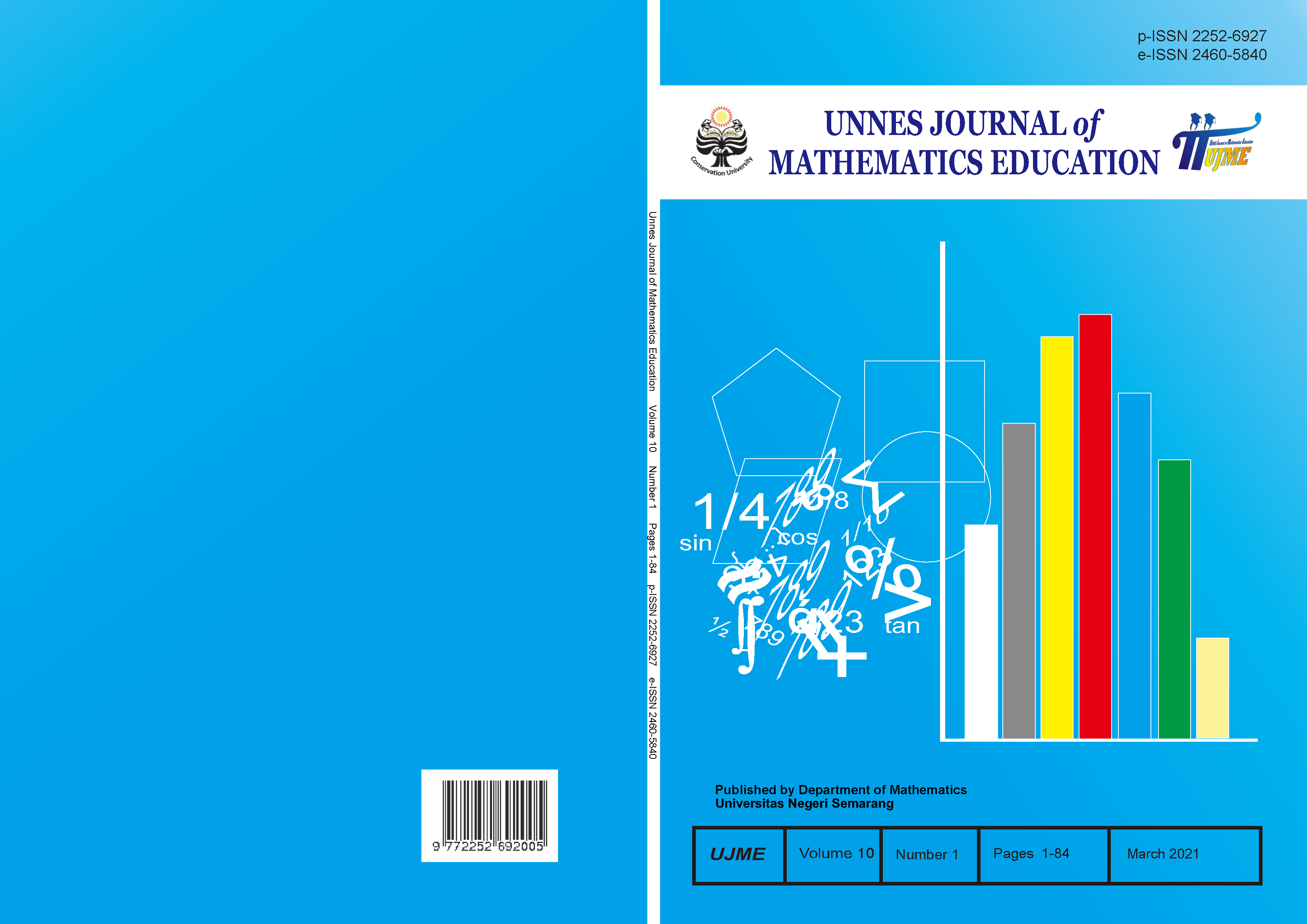Mathematical critical thinking ability in terms of mathematical anxiety in Smart Card assisted Brain-Based Learning model
##plugins.themes.academic_pro.article.main##
Abstract
This study aims to analyze the effectiveness of the Smart card-assisted Brain-Based Learning model against mathematical critical thinking skills, to analyze whether the smart card-assisted Brain-Based Learning model is more effective than the Treffinger model for mathematical critical thinking skills, and to describe students' mathematical critical thinking skills in terms of mathematical anxiety. This research applied quantitative method followed by a description. The population in this research were students of the seventh-grades on three of Junior High School in Ungaran in the academic year 2019/2020. This research applied the cluster random sampling technique as the technique for collecting the data. The subject of the research was selected from the experimental class. The researcher was used purposive sampling technique to select the subject of this research. The data was collected by using the test method, the questionnaire method, and the interview method. The quantitative data analysis used classical completeness test, mean difference test, and proportion difference test. The result of this study indicate that smart card-assisted Brain-Based Learning model is effective for mathematical critical thinking skills, but smart card-assisted Brain-Based Learning model is no more effective than Treffinger on mathematical critical thinking skills. In addition, the description of mathematical critical thinking skills in terms of mathematical anxiety is obtained that: (1) subjects with low mathematical anxiety are able to achieve the indicator (A) clarification well, indicator (B) assessments well, indicator (C) concludes well, and indicator (D) strategy well; (2) subjects with moderate mathematical anxiety are able to achieve indicator (A) well, indicator (B) well, indicator (C) quite well, and indicator (D) quite well; (3) subjects with high mathematical anxiety are able to achieve indicator (A) well, indicator (B) is quite good, indicator (D) is quite good.
##plugins.themes.academic_pro.article.details##
References
Alifia, I. (2018). Kemampuan Creative and Critical Thinking melalui Model Pembelajaran Treffinger dengan Strategi Metakognitif untuk Materi Bangun Ruang Sisi Datar Kelas VIII SMPN 1 Dau Malang. Jurnal Pendidikan Matematika, 4(2), 76-85.
Arpin, H., Ade, & Dwi. (2015). Pengaruh Tingkat Kecemasan Matematika terhadap Kemampuan Berpikir Kritis Siswa Kelas X SMA. Sainsmat, 2(1), 1-10.
Astuti, P., Hartono, Y., Bunayati, H., & Indaryanti, I. (2017). Pengembangan LKS Berbasis Pendekatan Pemodelan Matematika untuk Melatih Kemampuan Koneksi Matematis Siswa SMP Kelas VIII. Jurnal Pendidikan Matematika, 11(2), 61 – 78.
Chotimah, S., Fathoni, A. R., Martin, B., & Padillah, A. (2019). Pengaruh Pendekatan Model Eliciting Activities terhadap Kemampuan Berpikir Kritis Matematik Siswa SMP Negeri di Kota Cimahi. Jurnal On Education, 1(2), 68-77.
Fariha, M. (2013). Kemampuan Berpikir Kritis Matematis dan Kecemasan Matematika dalam Pembelajaran dengan Pendekatan Problem Solving. Jurnal Peluang, 1(2), 43-50.
Freedman, E. (2006). Do You Have Math Anxiety. United States: University of Florida. (diakses dari www.mathpower.com pada tanggal 09 Oktober 2020)
Hoque, R. (2013). Effect of Reinforcement on Teaching-Learning Process. IOSR Journal Of Humanities And Social Science, 7(1), 13-16.
Jensen, E. (2008). Brain Based Learning (Edisi Revisi). Yogyakarta: Pustaka Pelajar.
Juanti, L., Santoso, B., Hiltrimartin, & Cecil. (2016). Peningkatan Kemampuan Pemecahan Masalah Siswa Menggunakan Model Pembelajaran Treffinger. Jurnal Pemikiran dan Penelitian Pendidikan, 14(2), 198-217.
Maftukhin, M., Dwijanto, & Veronica, R. B. (2014). Keefektifan Model Pembelajaran Creative Problem Solving Berbantuan CD Pembelajaran Terhadap Kemampuan Berpikir Kritis. Unnes Journal of Mathematics Education, 3(1), 29-34.
Nisa’, R. (2016). Profil Berpikir Kritis Siswa SMP dalam Menyelesaikan Soal Cerita Ditinjau dari Gaya Kognitif dan Kemampuan Matematika. Jurnal Apotema, 2(1), 66-76.
Nurhayati, E., & Abrosin. (2009). Pengaruh Tingkat Kecemasan dalam Menghadapi Ujian terhadap Hasil Belajar Matematika Siswa. Jurnal Eduma, 1(2), 113 – 122.
Peker, M. (2009). Pre-Service Teachers’ Teaching Anxiety about Mathematics and Their Learning Styles. Eurasia Journal of Mathematics, Sciene & Technology, 5(4), 335 – 345.
Peraturan Menteri Pendidikan dan Kebudayaan Republik Indonesia Nomor 20 Tahun 2016 Tentang Standar Kompetensi Lulusan Pendidikan Dasar dan Menengah. (Decree of The Indonesian Minister of Education and Culture Number 20, 2016).
Prasetia, Y., Wijayanti, K., Dewi, N. R., Mashuri, & Veronica, R. B. (2019). Mathematical Connection Ability Viewed from Gregorc Thinking Style on CORE Learning Model. Unnes Journal of Mathematics Education, 7(1), 910-914.
Pratiwi, L. A., Dwijanto, & Wijayanti, K. (2019). Analisis Kemampuan Berpikir Kreatif Matematis pada Pembelajaran Read, Think, Talk, Write Ditinjau dari Kecemasan Matematika. In Prosiding Seminar Nasional Matematika. Semarang.
Rinaldy, M., Imron, A., & Susanto, H. (2018). Hubungan Perhatian Siswa dalam Proses Belajar Mengajar dengan Hasil Belajar pada Mata Pelajaran Sejarah. Jurnal Unila, 6(3), 1 – 12.
Saparina, R., Santosa, S., & Maridi. (2015). Pengaruh Model Brain Based Learning (BBL) terhadap Hasil Belajar Biologi Siswa Kelas X SMA Negeri Colomadu Tahun Pelajaran 2012/2012. Bio-Pedagogi, 4(1), 59-65.
Setyowati, A., Budiyono, & Riyadi. (2013). Eksperimentasi Model Pembelajaran Kooperatif Tipe Teams Games Tournament (TGT) dan Fan-N-Pick pada Prestasi Belajar Matematika Ditinjau dari Kecemasan pada Matematika Siswa SMP Negeri di Kabupaten Magelang. Jurnal UNS, 3(1), 606-618.
Solihah, S. (2019). Meningkatkan Kemampuan Berpikir Kritis Matematik siswa MTs dengan Menggunakan Metode Brain Based Learning. Jurnal Teorema: Teori dan Riset Matematika, 4(1), 55-64.
Sulistiani, E., & Masrukan. (2016). Pentingnya Berpikir Kritis dalam Pembelajaran Matematika untuk Menghadapi Tantangan MEA. In Seminar Nasional Matematika X. Semarang.
Susanti, V. D., & Adamura, F. (2018). Pembelajaran Brain Based Learning untuk Meningkatkan Berpikir Kritis Matematis Siswa. In Prosiding Seminar Nasional Matematika dan Pendidikan Matematika. Semarang.
Wahyuni, S., Sabil, H., & Ramalisa, Y. (2017). Pengaruh Penggunaan Model Treffinger terhadap Kemampuan Berpikir Kritis Siswa dalam Memecahkan Masalah Matematika pada Materi Lingkaran Siswa SMP Negeri 22 Kota Jambi. Jurnal Unja, 1(1), 2 – 8.
